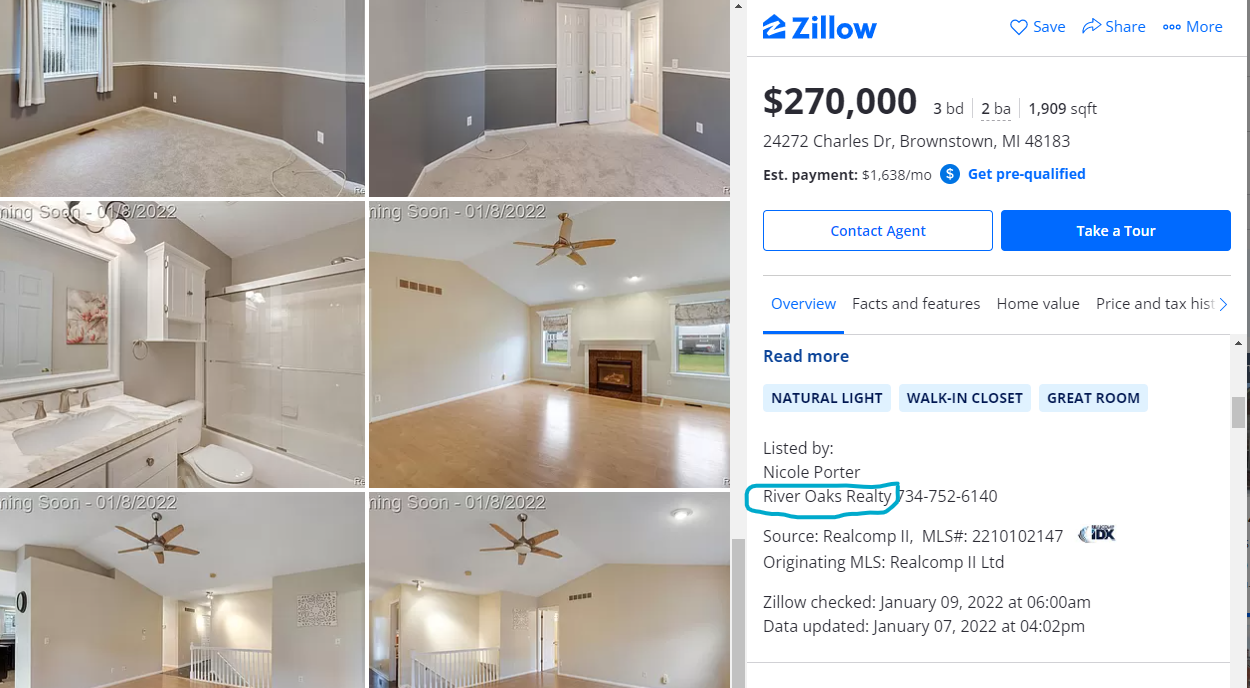Getting sponsored by a real estate broker is a critical step to becoming a real estate agent.
Working under a sponsoring broker is a requirement. All real estate agents with a salesperson license must be sponsored by a broker.
It’s common for most prospective agents to find their sponsoring broker while going through their pre-licensure courses and prior to taking the real estate exam. However, it can be done after you pass your exam.
So, how do you get sponsored by a real estate broker?
That’s what we’ll cover in this article. We’ll walk you through a series of steps for evaluating potential sponsoring brokers so that you find the broker that fits for you.
What Is A Sponsoring Broker?
A sponsoring broker in real estate is a fancy way of saying the brokerage that will “employ” you.
I use the word employ loosely and in quotes because, most often, real estate agents work as independent contractors for their broker rather than as true employees.
As a real estate agent, your license must be held under a sponsoring broker. It’s the law. You can also have only one sponsoring broker.
It’s a license held under a broker that allows you to practice real estate. Without a broker, a basic real estate salesperson license doesn’t allow you to practice real estate alone and without the guidance of a broker.
Only brokers can transact real estate deals alone.
There are 106,548 real estate brokerage firms operating in the United States, according to the National Association of Realtors. Meaning, there is no shortage of potential sponsoring brokers.
But choosing the right broker to sponsor you is a big deal and a critical step to becoming a real estate agent. Let’s go over the five step process for getting sponsored by a real estate broker.
Step 1: Take A Self-Assessment
Taking an honest self-assessment is the first step to getting a broker to sponsor you. Reflect on your needs, strengths, weaknesses, dislikes and more.
This will help you create a list of requirements and items you want your sponsoring broker to have.
Every real estate brokerage is different. They all have their own unique culture, tools, training, and style.
A self-assessment helps you narrow down your list of potential real estate brokers and increases the odds of finding a sponsoring broker that is a perfect fit for you.
Here are some questions to ask yourself:
- What are my strengths (skills, knowledge, personality, etc.)?
- What are my weaknesses or gaps (skills, knowledge, personality, etc.)?
- What kind of culture do I want to be part of?
- Do I want to work remotely or do I prefer a brick-and-mortar broker?
- What do you believe you need in order to succeed in real estate?
- What are you looking to achieve?
Of course, some of these questions you will be guessing. It’s impossible, unless you have experience, to have an accurate idea of your exact needs in order to have a successful career in real estate.
However, it’s better to have a basic list built around assumptions and facts than winging it. Without an assessment, you increase the odds of picking the wrong real estate broker.
Consider Short- And Long-Term
As part of the assessment, you need to think across various timelines. You have to simultaneously think about the short-term immediate fit of a sponsoring broker, as well as the long-term fit.
A short-term perspective will often be within a year. What do you need from your broker in your first year? Often, prospective real estate agents should be concerned with available training and how they can get their first client.
Some questions to ask yourself include:
- How will this broker teach me to get my first client?
- How will this broker help me close my first deal and show me the ropes of a real estate transaction?
- What kind of production is common for first year agents? Are they still with the company after a year?
You have to consider the long-term fit of the broker as well. Are they a fit after the first year — when you’ve completed a few deals and have a solid grasp of the real estate fundamentals?
In this timeline, you want to consider how they will help you improve your productivity, earn more on an hourly basis, and work with various types of clients (FSBO, expireds, relocation, and more).
It’s about aligning yourself with the broker that will help you build the career and life you want. Whatever that looks like.

Step 2: Gather A List of Brokers
After the assessment, it’s time to create a list of potential brokers. At this point, we’re not trying to evaluate brokers. We’ll do that later. We’re only trying to get a list of names onto paper.
There are a few ways you can do this. First, a simple Google search for “real estate brokers near me” will reveal a list of potential sponsoring brokers.
However, I find this often generates a small list of potential brokers. Instead, I recommend using Google differently and then going through a manual process.
Instead of searching using a keyword like “real estate brokers”, I recommend searching big-name brands near you. For example, your search queries should be something like “Keller-Williams near me” or “Exit Realty near me”.
Of course, this method leaves out independent brokers. For that, you will need to conduct a manual research method using yard signs or Zillow listings.
While driving around in your normal day-to-day life, you can start to write down the brokerage name that is on a yard sign. By law, all yard signs must contain the broker’s name.
I don’t recommend hoping in your car and driving through a bunch of different neighborhoods. It’s not very efficient. Use the yard sign method only on your normal routes.
A more efficient method is to use all of the listings on Zillow. Go to Zillow and begin clicking on active listings. If you scroll down, you will find information for the listing agent and their sponsoring real estate broker.
In this example, the agent is Nicole Porter and the sponsoring broker is River Oaks Realty.

Think About Broker Location
When searching for brokers, I recommend that you look within a comfortable driving distance. You’re not going to want to drive too far to complete training classes or go to closings.
You can also look for real estate brokers in specific areas that you want to work in. For example, some brokers can control the majority of listings in specific neighborhoods or cities.
Where I’m from, for example, there is a specific broker that controls a majority of the listings in Grosse Ile. Their office location creates a dominating presence that is challenging for any other real estate broker or agent to compete with.
Since real estate licenses are state specific, it means agents can practice anywhere within the state. As you’re using the Zillow listing method, be aware that a certain portion of listings will have brokers that could be more than an hour away or some other unreasonable distance.
For example, I’m in Metro Detroit. It can easily take an hour to drive from the southern side of Metro Detroit to the northern side. Yet, I will see real estate agents from north Metro Detroit have listings in the southern side. This is likely common for many large metropolitan areas.
Step 3: Narrow Down Your List
Every person that goes through the first two steps, will have a list of various sizes. It’s going to be specific to your location and real estate market.
Some real estate markets are heavily consolidated and only have five potential real estate brokers. Other markets can be diverse and offer twenty, thirty or more.
For example, in the Downriver area there tends to be a lot of small independent real estate brokers. It’s because the area prefers “local”. On the other hand, there are only about eight different Lansing real estate brokers, and most of the market is controlled by three of them.
Regardless of how big your list is, your next step is to narrow the list down to three to five potential sponsoring brokers.
You’re going to do this with some high-level research on the internet and comparing it to your self-assessment list.
Below is a list of things to consider.
Commission Splits and Structures
Commission splits are an important consideration when evaluating different sponsoring brokers. They directly control how much money you take home.
However, there is more to commissions than just the numbers. There is often an inverse relationship between support and services offered by a broker and the commission percentage.
It’s a common rule that real estate brokers who offer more support tend to offer lower commission splits to their agents. The vice-versa is also true. Better splits often mean less support.
Of course, this isn’t cut and dry but can be used as a general assumption for help evaluating different brokers.
This leads to the conclusion that brokers with high splits to their agents aren’t going to be good at helping new real estate agents become established and succeed.
But, what is a high split? It’s common for new agents to have splits around 50-50, 60-40, or 70-30. Anything better than that, like 80-20, I would be hesitant about.
There are likely poor sponsoring brokers for new agents and those who need support or they may have a lot of hidden fees that can add up.
For example, you might find a broker that offers an 80-20 split, but you’re responsible for paying for their training programs.
Same Brokers Different Commissions
The real estate industry isn’t short of different commission splits and structures. I have a love-hate relationship with commission splits.
They are important to talk about for obvious reasons — it determines how much money you get to take home. But, the plethora of commission split models makes it difficult for real estate agents to be able to compare real estate brokers effectively.
Even real estate brokers within the same franchise system can have wildly different commission structures and real estate agent fees.
For example, when I was with Century 21 Looking Glass, the company offered a 70-30 split with an additional eight percent fee paid to Century 21 corporate and an $18,000 cap.
It essentially worked like this: a 62-38 split, where 62 percent went to me and 38 percent to the broker. When I paid $18,000 to the broker, the commission structure then moved to a 92-8 split.
I also interviewed with Century 21 Riverpointe. During that time, their commission model was based on individual agent production. In other words, how many homes you sold and the total volume.
Since it’s been a while, I can’t remember the exact figures, but it went something like this. Every agent started at a 60-40 split without the additional eight percent to corporate.
An agent that produced more than $1-million in sales within a year, would effectively receive a raise and a new base split of 70-30. If you could produce $3-million, it would move up to 80-20.
Two real estate brokers within the same franchise model, but offering very different commission split models. Don’t assume that just because brokers are part of the same franchise they all offer the same splits.
It’s Not All About Commission Splits
It’s not all about the exact commission split on any individual deal. Instead, you must simultaneously think about how a specific real estate broker may help you add more sales and increase production.
For example, 90 percent on one transaction may not be worth as much as 70 percent on five deals.
Let’s look at the numbers on this in a little more detail. The average price of a home is about $260,000 according to Zillow.
An agent often earns a three percent commission, or about $7,800 in gross commission income. At this point, the brokerer will take a percent off the top.
An agent getting 90 percent will have their broker take $780, or ten percent. The agent working for a broker with a 70-30 split will have $2,340 taken from them.
Imagine at the end of the year, the agent with the higher split is only able to complete three transactions for a total income of $21,060. The agent with a lower split, because of the support, is able to complete six deals for a total income of $32,760.
You see, it’s not just the commission split you need to think about. You have to consider the relationship between the commission structure and the influence a particular sponsoring broker will have on your ability to sell more homes.
The ideal world is a broker that offers a high split and will help you sell the most amount of homes. But, there is often a tradeoff between these two elements.
You need to find the balance between what you’re comfortable with and willing to accept.
Surprise: Real Estate Broker Fees
In addition to commissions, you may have real estate fees that you need to pay to your sponsoring broker. These can be in the form of:
- Desk or office fees (monthly rent to the office)
- Transaction fees
- Errors and Omissions insurance fees
- Technology fees
- Administrative fees
- Annual membership fees
Just like there are various commission structures, there are various potential fees. It’s rare to find a real estate broker without any fees.
However, the total amount of fees and when they’re due can vary. For example, some fees are fixed costs that you need to pay every month (desk fees). Others are only paid when you complete a transaction (transaction fees).
Is Your Broker Aligned With Your Goals?
As an agent, it’s best to be sponsored by a real estate broker that aligns with your goals. For new real estate agents, this often means finding a broker that will minimize the amount of monthly fixed expenses.
Ideally, you would look for a broker that doesn’t have a desk fee, technology fee, or other ongoing monthly fee.
The reason most agents fail within their first year is because of a lack of cash flow. They have a lot of money going out but not enough coming in. It’s hard to build a sustainable career in real estate if you have a lot of money leaving your bank account but not much coming in.
This is further compounded if deals take longer to happen than you imagined or you’re not doing the number of transactions you hoped for.
I argue that a real estate broker, whose business model is built on charging its agents fees, isn’t aligned with a new real estate agent.
In contrast, a broker whose main revenue comes from agents closing deals, and not fees, is more aligned with real estate agents. These brokers only make money when you close a deal. For that reason, they want you to get clients and sell homes.
A fee based company doesn’t care if you close a home. Their only incentive is to make sure that you’re paying the office rent and technology fees. As long as you’re doing that, they don’t care.
Take Exit Realty
Broker alignment is why I’m biased for companies like Exit Realty for new agents, individual agents, and agents who are looking for more support. Exit is a company that is aligned with an agent’s desire to sell more homes.
They don’t make any money off desk fees, for example. There are none. This saves a real estate agent between $500 to multiple thousand dollars.

Exit is a great potential sponsoring broker for agents that have been burned by the low-support, high-fee, high-split broker model.
Names that fit this bill often come to my mind are eXp, Re/max, Keller-Williams and others. I’m not saying these are bad.
They certainly have their place for certain agents, like those looking to build teams, agents with years of experience or deep knowledge in marketing and sales, or those with extensive networks. The reality is that’s not the average agent.
They need a high-support low-fee model.
Now that we’ve talked a lot about the money side of things, let’s turn our focus to how a broker can help you sell more homes.
Lead Generation Opportunities
Many agents are surprised to learn about the lead generation requirement in order to succeed in real estate. Leads are either generated by the agent, through their network, time or marketing dollars, or provided by the broker.
Every sponsoring broker offers different opportunities for generating leads. Some offer Zillow leads, floor time, or a website that produces company leads. Some won’t offer anything and the agent is solely responsible for producing their own leads.
If you don’t have any experience in marketing, it should be a priority to align yourself with a sponsoring broker that offers various lead generation opportunities. Otherwise, you will struggle to sell enough homes.
Marketing and building a brand aren’t easy in the real estate industry. It’s super competitive and a challenge for the average real estate agent.
Quick Tip: I recommend looking for points of differentiation. Don’t be fooled by real estate brokers that offer business cards, name riders, a website, and a CRM. These are pretty standard marketing elements that all brokers offer.
Instead, look for unique opportunities for generating leads. Examples include Zillow leads, an in-house marketing aid to help review or produce marketing material, or floor time.
Tech Tools And Software
Real estate is becoming increasingly digital and technology-driven. Covid really drove that trend forward and made it a requirement.
While evaluating brokers, it’s good to align yourself with a brokerage that offers a suite of technology solutions — from basic transaction management software to a sales customer relationship management (CRM) software.
The more technology solutions, the more technology-driven you can be. This will help you serve your clients at a high-level, as well as make you more efficient. Allowing you to earn more while working less.
Most real estate brokers offer a standard suite of technology. For example, many offer transaction software, a CRM, and a website. But, there are still points of technology differentiation among brokers.
For example, some offer marketing software to help aid in direct-mail campaigns, others will help you draft sales letters to send to FSBOs. Still others can help you automate email newsletters to your database of leads and sphere of influence.
Training And Education
Local laws, sales skills, lead generation, and client communication are fundamentals to a successful real estate career, but they aren’t something you learn in your pre-licensure courses. These are topics you will learn from your sponsoring broker, real estate courses, or a real estate coach.
As a new agent, training and education is a top priority. It’s a perfect example of the need to “learn before you earn”.
Avoid feeling alone, confused, and uncertain by joining a training-based real estate brokerage. Find a company that will support your skill and education needs.
They should offer a comprehensive training program and have as much training as possible to help you develop in your career.
Some topics you want to be able to learn from your sponsoring broker:
- Lead generation skills and methods
- Lead conversion and sales skills
- Local fundamentals and industry best practices
Ideally, all of this training is free at your broker. Look out for brokerages that charge money for every training opportunity. This can really add up.
Next thing you know, you spent $2,000 in training and still don’t have a client. Not a great place to be.
Do They Have A Mentorship?
Real estate is a get your hands dirty industry. You learn best by seeing and doing. It’s not enough to go through a class and learn information.
It’s better to work closely with a mentor to guide you and see how that information is applied. It’s one thing to know and another thing to do.
Few sponsoring brokers offer mentorship programs, and it’s more likely to be a byproduct of a broker’s culture.
For example, Exit Realty has a culture that supports mentorship. I’m not suggesting that every Exit Realty will have a mentorship program, just that agents are financially incentivized through the Exit formula to become mentors.
Exit Realty is one of the few brokerages that pays its real estate agents to recruit and train other real estate agents.
Because of this, an agent may get more help and training with lead generation, listing presentations, and so much more.
Step 4: Deep Research On Your List
At this point, you have a small number of sponsoring brokers that you want to move forward with. You’re going to start an in-depth research process to find the broker that is the best fit for you.
Here you’re going to interview specific sponsoring brokers on your list, get an idea of their culture, and validate the information you found during your high-level research phase.
Your goal is to narrow your list down to one broker.
Interview Real Estate Brokers
Your in-depth research process starts with interviewing potential sponsoring brokers. It’s your goal to validate information uncovered in your research, as well as learn about anything you may have missed.
It’s important to realize that getting sponsored by a real estate broker isn’t like getting hired by an employer. Real estate agents contribute more value to a broker, and therefore, have the upper hand in an interview.
So, interviewing a real estate broker is more about you asking questions than a broker asking you questions. Instead of making a sales pitch about why you’re the best candidate for hire, the sponsoring broker will make a sales pitch for why they’re the best broker to work for.
During your interview, you want to validate what you discovered in the research process, such as:
- Commission splits and real estate fees
- Lead generation opportunities and technology solutions
- Training and education available and the cost (if any)
- In-house staff that will help you process transactions or with items like marketing
- How they differ from other brokerages in the area
You will hear a lot about commission splits during an interview. It’s important, but work to shift the conversation to a broker’s tools, lead generation opportunities, their culture, and how they will help you in your real estate career.
Things To Look Out For
As they say, the devil is in the details. This is true when interviewing brokers. I know it seems laborious and a hassle, but your goal is to uncover all of the little details.
For example, you want to know if the sponsoring broker has any mandatory requirements, like floor time or meetings. You have to find all of the hidden fees that aren’t readily apparent.
For example, when I interviewed my first broker, I never thought to ask about personal deals. What would happen if I bought a home for myself while working at the broker? Do I need to split the commission?
It turned out, my company only charged a $350 fee for a personal deal. Meaning, I could keep the full 3 percent for acting as my own buyer’s agent.
I got lucky with that, but imagine if I worked for a broker that didn’t offer that. I may have ended up paying the full commission split to the broker.
What’s The Culture?
You can tell a lot about a real estate brokerage by their office and the agents that work there. During the interview process, you should ask for a tour.
Use it as an opportunity to look around the office, study the agents, and talk to some of the agents.
For example, when I was looking for a sponsoring broker, I interviewed two brokers with very different cultures. I could tell their cultures by the way the office was organized.
At one broker, there were a lot of private or semi-private offices. This created a private culture and didn’t facilitate communication among agents. New agents were often separated from more experienced agents and didn’t allow for opportunities for new agents to interact with experienced agents.
The other broker had an open-concept. Closer to a start-up. It facilitated a lot more agent communication within the company and fostered a closer culture. The broker’s culture was more of a family feel.
Second, look at the people that work there. Are they friendly? Closed off in offices? Do they dress professionally or are they more laid-back? Note all of these things as it will tell you the culture that exists there.
Sometimes this may be very different from the culture a broker is trying to build.
Ask yourself if you can picture yourself working here with the people in the office? Is this a culture you enjoy and would mesh with?
If not, you probably won’t like the brokerage and should probably consider another place.
Evaluate The Broker Not The Name
During your research process, it’s important to evaluate the broker and not fall in love with the name behind the broker.
What I mean by this is to evaluate the specific broker, not the franchise company a broker is part of.
For example, you may fall in love with a franchise company or brokerage like eXp, Exit, or Century 21. However, it’s important to look at the brokerage you will become part of.
The reality is that some brokers within a franchise system may be a poor fit because they fail to integrate all of the tools that the franchise company offers or they may have a culture that is different than the one the franchisor has tried to create.
As an example, Century 21 offers a program through MoxiWorks that is supposed to help with internet lead generation. However, the Century 21 I was formerly part of, Century 21 Looking Glass which was acquired by Century 21 Affiliated, failed to roll out the new program to its agents.
So, don’t become blind to a specific brokerage because you love what the bigger name offers or represents.
Ask About Financials
The last point only applies to very specific real estate brokerage models. There are companies that offer things like profit-sharing. I’m not really a fan of these models, but let’s go over them briefly in case you’re considering it.
I’m not going to get into the weeds about this, but the idea is that the broker will share a portion of the profit with its agents based on various factors.
The key is determining the profitability of a brokerage. You’re going to want to have an idea of how profitable the brokerage company is in order to determine your potential profit share — if any.
It doesn’t make sense to join a broker that offers a profit sharing program that fails to produce a reasonable profit every year. But, you also don’t want to be part of a company that generates too much profit, and therefore, never invests the money back into the company or its agents.
I ran across a real estate brokerage that produced a reasonable profit, but appeared they were hoarding the money rather than reinvesting it back into the company to help agents. For example, their website looks like it was built in the early 2000s and hasn’t been updated since.
Don’t be afraid to ask about the financials if you’re joining a company that offers some profit sharing program.
Step 5: Commit A Broker
The last step is to commit to a broker. Hopefully, you found one that you feel comfortable with. At this point, you simply need to commit to them and you can become an agent at their company.
You have now found yourself a broker and can get sponsored by a real estate broker.
If you went through the in-depth process and don’t like any of them, no worries. We recommend going back to your list of real estate brokers and starting the process over again.
Another quick note: don’t be afraid of making the wrong choice. You can always change brokerages at a later time. Just make sure that if you sign an agreement, there isn’t a clause that would require you to stay.
These may or may be enforceable. Be aware of them.
There is a chance that as you grow in your real estate career, you may shift brokerages. I was at my first broker for two years. I probably stuck around longer than I should have because I outgrew them after my first year in business.
So, don’t be afraid to commit but also don’t rush it. Take your time.
Conclusion
You have plenty of options when it comes to getting sponsored by a real estate broker. It’s not a decision to take lightly, especially as a first year or new agent. The broker you pick can mean the difference between success and failure. If you end up picking the wrong place, don’t be afraid to pivot.
At this stage, I would encourage you to learn about EXIT Realty. As a mentor and Exit Realty agent, I can help connect you to an EXIT office in your area. You can partner with me.




